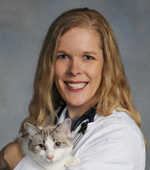Food safety Frank was walking around the vet college with me yesterday and we ran into my research pal, Dr. Kate Stenske KuKanich.
It took about 10 seconds and they were into a full discussion of pet food safety, the role of pets as carriers of salmonella, and how infections cycle throughout the home.
Wal-Mart is asking more of its pet food suppliers; that’s good.
Dr. Kate wrote a report for the June 1, 2011 issue of the Journal of the American Veterinary Medical Association (JAVMA), laying out  recommendations for pet owners on how to avoid Salmonella infection in pets; that’s good too.
recommendations for pet owners on how to avoid Salmonella infection in pets; that’s good too.
From the AVMA press release that went out last night:
The report, written by Kate S. KuKanich, DVM, Ph.D., DACVIM, details the circumstances under which Salmonella organisms are most often ingested and includes a history of Salmonella outbreaks associated with pet food and treats. In addition, it offers recommendations on how pet owners can minimize the risk of Salmonella infection for both their pets and families.
Recommendations include:
Avoiding raw food diets for pets.
Purchasing individually packaged pig ears, rather than buying them from bulk bins.
Checking the packaging of pet food products to ensure that they are in good condition prior to purchase; returning products to the store if they appear tainted, discolored, or malodorous.
Storing pet foods, treats, and nutritional products in accordance with label instructions, preferably in a cool, dry environment.
Saving the original pet food packaging material, including the date code and product code of all food products, for product identification in case of food contamination.
Discouraging children, the elderly, and immunosuppressed people from handling pet food and treats.
Washing hands with soap and water before and after handling pet food, treats, and nutritional products.
Using a clean scoop to dispense pet food into bowls.
Washing water and food bowls used by pets, as well as feeding scoops, routinely with hot soapy water in a sink other than in the kitchen or bathroom.
Avoiding feeding pets in the kitchen.
I like working with smart people.
